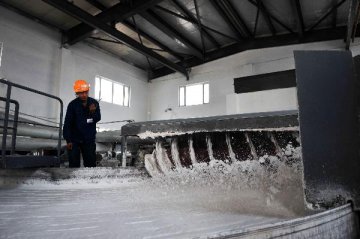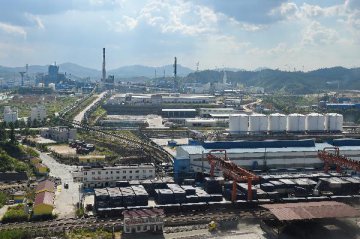
Egypt's economic growth rate during the fiscal year 2016/17 exceeded the government's expectations, reaching 4.1 percent while the total budget deficit hit 10.9 percent of the Gross Domestic Product (GDP) compared to 12.5 percent in the previous fiscal year.
During a meeting with Egyptian President Abdel-Fattah al-Sisi, Planning Minister Hala al-Said said that indicators showed that the economic growth rate reached 4.9 percent during the last quarter of the fiscal year 2016/17, which ended in late June, bringing the annual economic growth rate to 4.1 percent.
The minister added that the GDP growth rate increased for the first time since 2007, in addition to an increase in commodity exports by 10 percent and a decrease of imports by 14 percent.
Trade deficit dropped by 26 percent, and the unemployment rates declined during the third quarter of the fiscal year from 12.7 to 12 percent, reflecting an increase in employment opportunities as a result of national projects being implemented across the country, al-Said said.
Meanwhile, Sisi asserted, during another meeting with Prime Minister Sherif Ismail and Finance Minister Amr al-Garhy, the necessity of maintaining efforts to cut the budget deficit and debt rates in the new budget for the fiscal year 2017/18, state-run MENA news agency reported.
Sisi also called for rationalizing spending, increasing growth rates and raising social security allocations through supporting food commodities and expanding direct cash support programs.
During the meeting, al-Garhy reviewed a report on the initial estimates of financial performance for the fiscal year 2016/17.
The report showed that Egypt's total budget deficit hit 10.9 percent of the GDP compared to 12.5 percent in the previous fiscal year.
The primary budget deficit for the fiscal year 2016/17 reached 1.8 percent, worth 63 billion Egyptian pounds (3.55 billion U.S. dollars) against 3.5 percent, 96 billion Egyptian pounds in the past fiscal year.
The annual revenue growth stood at 28 percent of the GDP, which surpassed the annual expenditure growth that amounted to 22 percent of the GDP, according to the report.
Furthermore, the finance minister asserted that the fiscal year 2016/17 witnessed an increase in the foreign investment rates and an improvement in the trade balance in general, especially with regard to non-petroleum products.
Moreover, the fiscal year saw a surge in production rates and the demand for goods produced by private sector companies reached unprecedented levels, the minister said.
Exports also reflected a remarkable improvement in the country's economy, according to the minister's report.
Egypt's government hopes for further foreign direct investments (FDI) to boost the country's economy that has been suffering over the past six years.
Massive political turmoil and relevant security issues have led to declining tourism and foreign investment amid growing budget deficit, inflation rate and foreign and domestic debts.
On Friday, the Egyptian ministry of investment said that FDI in Egypt rose by 26 percent to reach 8.7 billion dollars in the 2016/17 fiscal year, compared to 6.9 billion dollars in the previous year.
To attract foreign investors, Egypt has floated its local currency's exchange rate and has taken a series of measures to ease investment process.
Egypt's efforts to revive its economy have started to yield good signs as Saudi Prince Alwaleed bin Talal, also a businessman, announced on Monday that he will invest more than 800 million dollars in the North African country that used to be an attractive investment hub a few years ago.
The most populous Arab country has also started last year a three-year economic reform program including austerity measures, fuel subsidy cuts and tax increase.
The program is encouraged by a 12-billion-dollar loan from the International Monetary Fund.





















Latest comments